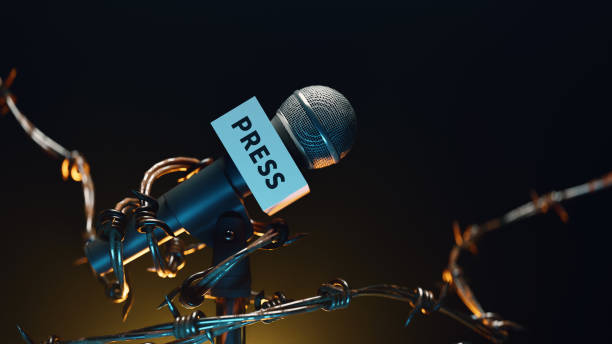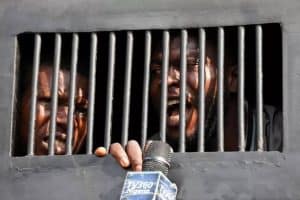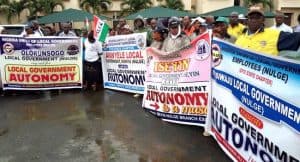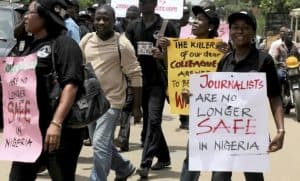
A reporter's microphone at a press conference, through barbed wire. 3d rendering
How best can one celebrate Press Freedom Day in Nigeria where dozens of journalists are put behind bars, persistently harassed, and threatened by state and non-state actors?
The Nigerian authorities seem to be at war with the media. In its 2023 World Press Freedom Index, Reporters without Borders, a non-profit global organisation, stated that Nigeria is one of West Africa’s most dangerous countries for journalists.
In the first eight months of 2023 alone, a media think tank, the Centre for Journalism Innovation and Development (CJID), documented 74 attacks against Nigerian journalists in the country. Despite the clamour for press freedom since independence in 1960, the trends of attacks against journalists and media houses have continually increased.
As the world marks Press Freedom Day, journalists and media practitioners operate in a shrinking space that makes their work a hard nut to crack.
In September 2023, some officers of the Federal Road Service Commission (FRSC) in Nigeria’s capital city attacked Mustapha Usman, a journalist with the International Centre for Investigative Reporting (ICIR). The journalist could not count the number of hands hitting his face when he was mobbed.
His only offence?
He was seen recording a scene involving some officers trying to seize a woman’s car illegally. Usman was aware that the media have sour relationships with security operatives in Nigeria. He watched closely and tried to record the harassment secretly.
He was embarrassed.
“When the situation became tense, one of the officers came to send people away. They also tried to drag me, and at that point, I made them realize that I was a journalist,” Usman told TheLiberatist. Despite showing them his identity card, the officers battered Usman mercilessly.
Usman believes the security operatives had something to hide. “They knew what they were doing was bad and out of their service rules and regulations, so they didn’t want anyone to capture the moment,” he added.
He said he’s worried that journalists are subjected to such attacks from both state and non-state actors. He also observed that the problem with these attacks is that they are mostly directed at journalists who want to expose societal ills.
A few months ago, Jaji Azeez, the Managing Editor of Informant247, a local online newspaper, was arrested and detained by the police over a story he did on the thriving corruption at the Kwara State Polytechnic. Jimoh Mohammed, the rector of the polytechnic, had reported to the police that Azeez’s platform published a story that accused him of fraud.
The journalist was locked up in a cell by the police without proper investigations.
Asked to advise authorities on how to tackle oppression against the media, Azeez said: “There needs to be a commitment from the government to uphold press freedom and respect the rights of journalists to do their work without fear of harassment, intimidation, or violence. This includes investigating and prosecuting attacks against journalists, as well as creating an enabling environment for independent media to operate.”
On March 15 2024, about ten armed men stormed the residence of Segun Olatunji, the Editor of First News, a Nigerian local newspaper.
Clad in military camouflage, the men bundled the journalist into a van from his home in the Abule Egba area of Lagos state.
Olatunji was kept incommunicado and his whereabouts were unknown to his family until the International Press Institute (IPI) revealed that officers of the Defence Intelligence Agency were responsible for his abduction.
The Nigerian military admitted to having arrested the journalist 12 days after the denial. He would later regain freedom after 13 days of unlawful detention.
Sharing his experience in a press briefing following his release, Olatunji said he was blindfolded and moved to Abuja, Nigeria’s capital city, from Lagos.
“They removed my clothes and I was left with my boxers. I was taken to Cell 9. There I was left in leg chains and handcuffs,” he narrated to journalists at the press briefing. “And at a point, one of the officers came and tightened the right leg and the right hand and I was there groaning in pain. They did not loosen it until about two or three days after.”
The journalist said security operatives were asking him questions about certain stories published via his local platform.
Similarly, Dele Fasan, the South-South Bureau Chief for Galaxy Television, also received his share of the trend of attacks against journalists.
On February 23, soldiers from the Nigerian Army 3 Battalion in Effurun, Uvwie Local Government Area of Delta State, arrested and detained Fasan for recording video clips at the scene of a planned protest against the economic hardship in the country.
Fasan was using his phone to take a video of people when a soldier demanded that he hand over his phone.
When he refused and identified himself as a journalist, another soldier hit him in the chest with a gun and ordered him into their van. He was handcuffed and his phone was forcefully taken from him and all the images he took in the morning were washed off.
After about an hour, Fasan was released when Aina Adesola, Deputy Commissioner of Police, in whose presence he was arrested begged on his behalf.
Similarly, Kasarahchi Aniagolu, a reporter based in Abuja was also assaulted and detained in the custody of the Anti-Violence Crime Unit of the Federal Capital Territory (FCT) Police Command.
The reporter suffered brutal treatment for monitoring a raid on Bureau de Change operators at the Wuse Zone 4 area of the FCT.
“I was going to AEDC when I observed a chaotic movement of men dressed in kaftans running towards the junction at zone 4, and scampering for safety,” she recalled.
Aniagolu observed operatives of the police force chasing the men and the situation incited unusual traffic around the area.
She was interrogated for covering the raid, and one of the officers pulled out her bag containing her laptop, slapping her so hard she lost her balance.
“She pulled me by my trousers and dragged me to one of the police Hilux vehicles. The officers in mufti and those in uniforms surrounded me and began to yell at me,” she said. “The female officer who slapped me struggled with me to confiscate my phone while a male officer in a black uniform hit my hand with a rifle.”
While she was bundled into their van, one of the female officers hit her hand, causing her phone to fall off her hands to the floor of the vehicle.
“The officer who inquired if I was a woman, cocked his rifle and pointed it at my throat, yelling release this phone or I’ll kill you and nothing will happen.”
Dayo Aiyetan, the Executive Director of the International Centre for Investigative Reporting (ICIR), said at an event on press freedom held in Abuja on May 2, that apart from government intuitions individuals can also be threats to journalists and their operations.
“Even the people we’re defending in reporting are also sometimes posing threats to journalists,” he said.
He added that state authorities have not stopped attacking journalists with repressive laws like the cybercrime act. He pondered why the media is not talking enough or doing reporting on some of the amendments in the act.
“In terms of challenges, particularly when it involves corporate stories and big companies also come for us. I don’t want to mention names, but we do stories and big companies we’re exposing… the chinese for example are paying locals to attack journalists,” he said.








